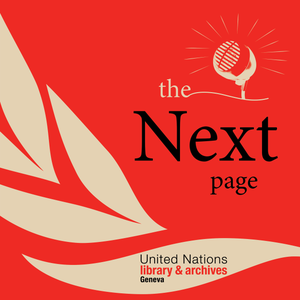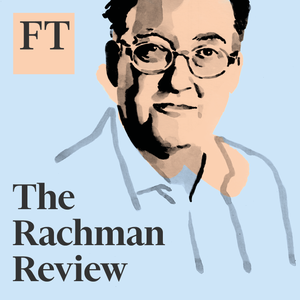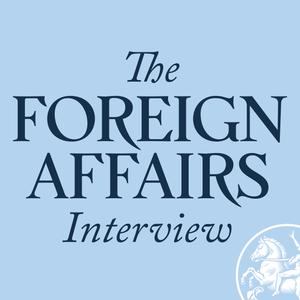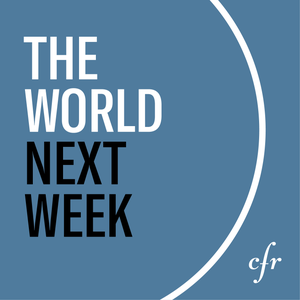
The Next Page
United Nations Library & Archives Geneva
Designed to advance the conversation on multilateralism
- 33 minutes 48 secondsFéminismes et multilatéralisme (1920-1970) avec Françoise Thébaud
Dans cet épisode, nous avons la grande chance d'accueillir Françoise Thébaud, professeure émérite d’histoire contemporaine à l’université d’Avignon, qui a publié de nombreux travaux sur l’histoire des femmes et du genre. Elle nous rejoint pour discuter de l’histoire de la place des femmes et des féminismes dans le multilatéralisme, en se basant sur deux de ses ouvrages : Les féminismes. Une histoire mondiale, 19e-20e siècle (codirigé avec Yannick Ripa) et Une traversée du siècle – Marguerite Thibert, femme engagée et fonctionnaire internationale.
Françoise Thébaud nous offre une plongée fascinante dans l’évolution des mouvements féministes à travers le monde et leur intégration au sein des organisations internationales, depuis la fin de la Première Guerre mondiale jusqu'en 1970. Elle nous fait explorer comment les femmes ont trouvé leur place dans ces institutions multilatérales, à la fois comme militantes et fonctionnaires, ainsi que les défis qu’elles ont dû surmonter pour faire avancer la cause de l'égalité des sexes à l'échelle mondiale.
In this enlightening episode in French, we delve into the historical journey of feminism and its influence on multilateralism, as seen through the lens of Françoise Thébaut, Emeritus Professor of contemporary history at the University of Avignon. Drawing from her works, "Les Féminismes,Une histoire mondiale, 19e-20e siècle" and "Une Traversée du siècle, Marguerite Thibert," we explore the diverse feminist movements from the post-French Revolution era to modern times.
We discuss the integration of feminists into international organizations from the end of World War I until 1970, highlighting significant contributions and challenges faced by women within these structures. Special attention is given to key issues like women's rights, social justice, and the historiography of gender history.
Through the biography of Marguerite Thibert, a trailblazing feminist and international civil servant, we uncover pivotal moments in the advocacy for gender equality. Her story illustrates the complex interactions between feminism, socialism, and peace movements across the 20th century.
As we look towards the future, Thébault invites us to reflect on the ongoing evolution of feminism amidst contemporary global challenges like climate change and migration. This episode serves as a testament to the enduring fight for gender equality and the transformative potential of feminist ideals in building a better world.
Ressources : Ask a Librarian!
Les féminismes : une histoire mondiale 19e-20e siècles / sous la direction de Yannick Ripa, Françoise Thébaud. Paris : Textuel; 2024. https://unog.primo.exlibrisgroup.com/permalink/41UNOG_INST/s5qper/alma991002543869602391
Une traversée du siècle : Marguerite Thibert, une femme engagée et fonctionnaire internationale / Françoise Thébaud. Paris : Belin; 2017. https://unog.primo.exlibrisgroup.com/permalink/41UNOG_INST/s5qper/alma991002298366902391
Dépasser la guerre froide ? Marguerite Thibert et la création du Bureau de liaison (1960) / Françoise Thébaud. Clio. Femmes, Genre, Histoire, 2023, p. 235‑249. https://unog.primo.exlibrisgroup.com/permalink/41UNOG_INST/1uhj92k/cdi_cleo_primary_oai_revues_org_clio_23612
Liste des publications de Françoise Thébaud : https://mnemosyne-asso.com/mnemosyne/annuaire/francoise-thebaud/
Exemple d’un dossier d’archives de la Société des Nations contenant une copie de la « Pétition internationale pour le Désarmement général » approuvée par le Comité du Désarmement créé par les Organisations Féminines Internationales (1931-1932) : https://archives.ungeneva.org/correspondence-with-the-disarmament-committee-of-the-womens-international-organisations
Exemple d’un document officiel de la Société des Nations sur la question de la nationalité des femmes mariées (1935) : https://archives.ungeneva.org/nationalite-et-statut-de-la-femme-exposes-des-organisations-internationales-feminines-supplement
Archives en ligne de la Ligue internationale des femmes pour la paix et la liberté (1915-1978) : https://archives.ungeneva.org/womens-international-league-for-peace-and-freedom
Où écouter cet épisode
- Apple podcasts: https://podcasts.apple.com/us/podcast/the-next-page/id1469021154
- YouTube: https://youtu.be/ye9f07sBLG4
Contenu
Invitée : Françoise Thébaud
Hôte : Hermine Diebolt
Réalisation : Amy Smith
Recorded & produced at the United Nations Library & Archives Geneva
24 January 2025, 5:30 am - 40 minutes 51 secondsCivil Society and Hope for the Future
Welcome back to The Next Page and to a new series for 2025. Join us as we start the year with Daniel Perell, a representative of the Baha'i International Community to the UN, to discuss the pivotal role of civil society in shaping the Summit for the Future. In this energizing conversation, Daniel shares insights on multilateralism, the impact of normative frameworks, and the evolution of values such as trust, solidarity, and justice within global governance.
Explore how the discussions surrounding the Pact for the Future, the Global Digital Compact, and the Declaration on Future Generations are reshaping our approach to international cooperation. Daniel delves into the analysis of key terms in UN documents, highlighting the emerging focus on intergenerational solidarity and the necessity of trust and trustworthiness in multilateral institutions.
Discover the influence of civil society in these processes and how collective agency can drive change in local and global contexts. Tune in to gain a deeper understanding of how the principles of interdependence and cooperation can guide us towards a sustainable and equitable future for all.
Resources: Ask a Librarian!
Embracing Interdependence: Foundations for a World in Transition: A statement of the Bahá’í International Community on the occasion of the United Nations Summit of the Future https://www.bic.org/statements/embracing-interdependence-foundations-world-transition
Thoughts on a New Year: Is our Vision of Progress Really Progress? | Bahá’í International Community
Where to listen to this episode
- Apple podcasts: https://podcasts.apple.com/us/podcast/the-next-page/id1469021154
- Spotify: https://open.spotify.com/show/10fp8ROoVdve0el88KyFLy
- YouTube: https://youtu.be/
Content
Guest: Daniel Perell, Baha’i International Community Representative to the United Nations
Host: Amy Smith, UN Library & Archives Geneva
Recorded & produced at the United Nations Library & Archives Geneva
10 January 2025, 8:19 am - 33 minutes 12 secondsMediation in a Complex International Landscape with Pierre Hazan
Join us for the final episode of the year as we discuss the nuanced world of international mediation with expert Pierre Hazan, a senior advisor with the Centre for Humanitarian Dialogue. Pierre is known for his extensive experience, and has advised international organizations, governments and armed groups on issues related to justice, amnesty, reparation, truth commission, forced disappearances, international humanitarian law, and human rights. In this conversation, Pierre Hazan shares his insights on the evolution of mediation within the multilateral framework.
Throughout the conversation, we explore the intricate intersection of peace and justice, reflecting on Pierre's career journey from journalism in war zones to diplomatic mediation. Pierre provides an understanding of how mediation strategies have transformed since the end of the Cold War, highlighting both challenges and opportunities for future conflict resolution.
Join us as we uncover the critical role that local actors, women, young people, civil society, and new technologies increasingly are playing and that leave room for hope in today's complex international landscape. Pierre also discusses his latest book, "Negotiating with the Devil: Inside the World of Armed Conflict Mediation," offering a thought-provoking look at the moral dilemmas faced by mediators in the field.
Resources: Ask a Librarian!
Hazan, P. (2024). Negotiating with the Devil: Inside the World of Armed Conflict Mediation. Hurst Publishers.
Pierre Hazan: https://pierrehazan.com/
Where to listen to this episode
- Apple podcasts: https://podcasts.apple.com/us/podcast/the-next-page/id1469021154
- Spotify: https://open.spotify.com/show/10fp8ROoVdve0el88KyFLy
- YouTube: https://youtu.be/
Content
Guest: Pierre Hazan
Host: Francesco Pisano, Director, UN Library & Archives Geneva
Production and editing: Amy Smith
Recorded & produced at the United Nations Library & Archives Geneva
23 December 2024, 11:17 am - 52 minutes 9 secondsThe Future of Diplomacy: preparing the next generation
In this enlightening episode, Nicholas Kralev, Executive Director of the Washington International Diplomatic Academy, discusses the future of diplomacy and preparing the next generation of diplomats. He shares insights from his latest book, "Diplomatic Tradecraft," exploring the essential skills and future of diplomacy.
Nicholas Kralev shares what drew him to the field, recounting his journey from a journalist during the post-Cold War era to a leader for diplomacy training. He discusses the vital role of empathy in diplomacy. Discover the unique challenges diplomats face, the importance of practical skills, and the need for greater investment in the field to prepare the next generation of diplomats.
The conversation also addresses the significance of diversity within diplomatic corps and how multilateral and bilateral diplomacy differ in skills and execution. Nicholas Kralev emphasizes the necessity for diplomacy to evolve and adapt in a rapidly changing world, urging governments to recognize its value as a professional discipline.
Tune in to uncover the complexities of international relations and how diplomacy can be the world's best hope in fostering global stability and understanding.
Resources: Ask a Librarian!
Kralev, N. (Ed.). (2024). Diplomatic Tradecraft. Cambridge: Cambridge University Press.
Washington International Diplomatic Academy: https://diplomaticacademy.us/
Where to listen to this episode
- Apple podcasts: https://podcasts.apple.com/us/podcast/the-next-page/id1469021154
- Spotify: https://open.spotify.com/show/10fp8ROoVdve0el88KyFLy
- YouTube: https://youtu.be/
Content
Guest: Nicholas Kralev, Executive Director, Washington International Diplomatic Academy
Host: Amy Smith
Recorded & produced at the United Nations Library & Archives Geneva
*This episode was recorded online
13 December 2024, 5:30 am - 1 hour 1 minuteAristide Briand : la conscience du monde mise à l'honneur
Dans cet épisode, nous explorons le parcours et l’héritage d’Aristide Briand avec trois invités : Patrice Bulting, Christophe Bellon, et Jean-Michel Guieu.
Aristide Briand (1862-1932), figure emblématique de la vie politique française du début du XXe siècle, a marqué l’histoire par son engagement pour la paix et sa vision politique unique. Grâce aux récits de nos invités, nous découvrons les multiples facettes de cet homme d’État et les initiatives qui ravivent sa mémoire aujourd’hui.
Patrice Bulting, président de l’association Aristide Briand, nous présente le projet de réinstallation du buste de Briand à Saint-Nazaire, 90 ans après sa disparition. Il revient sur les liens profonds entre Briand et sa ville natale, ainsi que sur les étapes marquantes de cette entreprise mémorielle.
Christophe Bellon, historien et biographe d’Aristide Briand, éclaire les moments clés de la carrière de Briand, notamment son rôle dans la loi de Séparation des Églises et de l’État et son action pendant la Première Guerre mondiale. Il partage également son analyse sur les qualités politiques exceptionnelles de Briand et le relatif oubli dont il a souffert auprès des historiens.
Enfin, Jean-Michel Guieu, spécialiste de l’histoire de la paix dans le premier XXe siècle, met en lumière l’impact international de Briand. De son rôle à la Société des Nations à la négociation des accords de Locarno et du pacte Briand-Kellogg, il explore les efforts de réconciliation européenne et la vision fédéraliste de Briand en faveur d’une Union européenne.
Ressources
Association Aristide BRIAND : http://aristidebriand.eu/
Bellon, Christophe. (2016). Aristide Briand : Parler pour agir. Paris. Editions du CNRS. https://www.cnrseditions.fr/catalogue/histoire/aristide-briand/
Guieu, Jean-Michel, et Stanislas Jeannesson (dir.). (2021). « La Société des Nations : Une expérience de l’internationalisme ». Monde(s). Histoire, Espaces, Relations, 2021/1, n°19. Presses Universitaires de Rennes. https://shs.cairn.info/revue-mondes-2021-1
Guieu, Jean-Michel, et Stéphane Tison (éd). (2022). La paix dans la guerre : Espoirs et expériences de paix (1914–1919). Paris. Éditions de la Sorbonne. http://www.editionsdelasorbonne.fr/fr/livre/?GCOI=28405100938730
Dossier d’archives de la Société des Nations sur le projet d’Union fédérale européenne proposé par Aristide Briand : https://archives.ungeneva.org/projet-dune-union-federale-europeenne-memorandum-du-gouvernement-francais-sur-lorganisation-dun-regime-dunion-federale-europeenne-1er-mai-1930
Où écouter cet épisode
- Apple podcasts: https://podcasts.apple.com/us/podcast/the-next-page/id1469021154
- YouTube: https://youtu.be/HwHfPVUC6M4
Contenu
Invités : Patrice Bulting, Christophe Bellon, Jean-Michel Guieu
Hôte : Hermine Diebolt
Réalisation : Amy Smith
Recorded & produced at the United Nations Library & Archives Geneva
6 December 2024, 5:30 am - 30 minutes 12 secondsExploring the intersection of VR, AI and Diplomacy
In this thought-provoking episode we delve into the fascinating intersection of virtual reality (VR) and artificial intelligence (AI) in the realm of diplomacy, highlighting their potential to transform multilateralism, peacebuilding, and peacekeeping.
Join us as we talk with Martin Wählisch, a UN professional with a wealth of knowledge and experience in innovative technological applications in diplomacy. Martin shares compelling insights from work in the UN and his current academic endeavors at the University of Birmingham, focusing on the integration of AI in governmental processes.
In this episode, we explore the roles VR and AI can play in conflict prevention, management, and resolution, offering concrete examples such as predictive analytics using machine learning for early warning systems, AI-powered public dialogues for peace negotiations, and VR experiences that foster empathy and understanding through immersive storytelling.
Dive into the challenges and opportunities that lie ahead as these technologies advance and reshape traditional diplomatic practices, all the while contemplating the ethical implications and necessary governance mechanisms. Don't miss this engaging conversation on how technology is revolutionizing diplomacy in a rapidly changing world.
Resources: Ask a Librarian!
- Futuring Peace
- My Medium articles
- The United Nations Virtual Reality Experiment on Vimeo
- UN Web TV Documentary
Where to listen to this episode
- Apple podcasts: https://podcasts.apple.com/us/podcast/the-next-page/id1469021154
- Spotify: https://open.spotify.com/show/10fp8ROoVdve0el88KyFLy
- YouTube: https://youtu.be/
Content
Guest: Martin Wählisch
Host: Francesco Pisano
Production and editing: Amy Smith
Recorded & produced at the United Nations Library & Archives Geneva
29 November 2024, 4:47 pm - 44 minutes 7 secondsHow to use AI in peace making and negotiations
Welcome to another episode of The Next Page. Today, we delve into the transformative role of artificial intelligence in diplomatic matters, focusing on its application in peacemaking and negotiations.
Claude Bruderlien, a researcher and lecturer at Harvard, shares his wealth of experience as a professional negotiator working with the UN and other international organizations. Claude discusses the evolution of negotiation training and the integration of AI into diplomacy to enhance strategic planning and international collaborations.
The conversation covers real-world applications of AI in various negotiation contexts, including campus and climate negotiations, providing unique insights into how technological advancements are shaping future diplomatic efforts. Discover how AI aids negotiators by filtering complex data, simulating scenarios, and improving cross-cultural communication, all while retaining the essential human elements of empathy and connection.
Resources: Ask a Librarian!
Frontline Associates: AI Negotiation Challenge platform, which is designed to help train negotiators in the use of AI in their negotiations.
Where to listen to this episode
- Apple podcasts: https://podcasts.apple.com/us/podcast/the-next-page/id1469021154
- Spotify: https://open.spotify.com/show/10fp8ROoVdve0el88KyFLy
- YouTube: https://youtu.be/LpD761ajkV4
Content
Guest: Claude Bruderlein, Researcher and Lecturer at the Harvard Kennedy School of Government, the Harvard T. Chan School of Public Health, and The Graduate Institute, Geneva
Host, production and editing: Amy Smith
Recorded & produced at the United Nations Library & Archives Geneva
22 November 2024, 5:30 am - 38 minutes 5 secondsReversing the Decline of Diplomacy for Peace: a conversation with David Harland
In this captivating episode we explore the evolving landscape of diplomacy and its pivotal role in fostering peace. Our guest, David Harland, the Executive Director of the Geneva Centre for Humanitarian Dialogue and a member of the UN Secretary General's High Level Advisory Board on Mediation, shares his vast experience and insights.
We cover the historical trajectory of diplomacy for peace, from its post-World War II successes to its recent decline, particularly over the past two decades. David discusses how diplomacy once effectively addressed existential threats, such as nuclear warfare, through strategic negotiations and treaties.
As we face new global challenges like climate change, pandemics, and artificial intelligence, David offers a critical analysis of how diplomacy has transformed and how it might adapt. He introduces concepts like "shifting constellations" and "hybrid diplomacy," highlighting the role of alternative actors, including NGOs and private companies, in today's diplomatic landscape.
Join us for a thought-provoking conversation on the future of diplomacy, the importance of setting priorities, and the potential for new diplomatic frameworks to address the pressing issues of our time. As we navigate this complex terrain, the question remains: will we assemble the tools necessary for a sustainable future?
Resources
Article: https://www.genevapolicyoutlook.ch/reversing-the-decline-of-diplomacy/
Geneva Centre for Humanitarian Dialogue: https://hdcentre.org/
Where to listen to this episode
- Apple podcasts: https://podcasts.apple.com/us/podcast/the-next-page/id1469021154
- Spotify: https://open.spotify.com/show/10fp8ROoVdve0el88KyFLy
- YouTube: https://youtu.be/ay0RRjNR6Fs
Content
Guest: David Harland, Executive Director, Geneva Centre for Humanitarian Dialogue
Host: Francesco Pisano, Director, UN Library & Archives Geneva
Producer and editor: Amy Smith
Recorded & produced at the United Nations Library & Archives Geneva
8 November 2024, 5:30 am - 30 minutes 12 secondsThe Forever Crisis with Adam Day
Welcome to a compelling episode with Adam Day, Head of the UN University Centre for Policy Research in Geneva on his new book, "The Forever Crisis." In this engaging discussion, Adam introduces the concept of complex systems thinking, exploring its applicability to global governance and the pressing issues of our time.
Adam shares his journey from his role as a senior political advisor in Congo to his current position at the UN University's Center for Policy Research. He explains how his experiences led him to delve into the intricacies of complex systems and their unpredictable, yet not entirely unpredictable, nature.
The episode dives into key themes from Adam's book, including environmental governance, large-scale conflict resolution, cybersecurity, and the rise of artificial intelligence. He offers a critique of today's proposals for improving governance on global issues. Adam emphasizes the importance of moving away from linear thinking and top-down approaches, advocating instead for adaptive, networked solutions.
In a thought-provoking conclusion, Adam introduces the idea of a planetary immune system—a visionary concept aimed at addressing global challenges holistically. This episode is essential listening for anyone interested in understanding and navigating the complexities of our world today.
Resources
Day, A. (2024). The Forever Crisis: Adaptive Global Governance for an Era of Accelerating Complexity (1st ed.). Routledge. https://doi.org/10.4324/9781003506386
Soon available at UNOG Library
Day, A. (2022). States of Disorder, Ecosystems of Governance: Complexity Theory Applied to UN Statebuilding in the DRC and South. https://unog.primo.exlibrisgroup.com/permalink/41UNOG_INST/s5qper/alma991002408952102391
Keinfield, R. (2015) Improving Development Aid Design and Evaluation; Plan for Sailboats not Trains. https://carnegieendowment.org/research/2015/03/improving-development-aid-design-and-evaluation-plan-for-sailboats-not-trains?lang=en
Gladwell, M. (2002). The tipping point. Back Bay Books.
Where to listen to this episode
- Apple podcasts: https://podcasts.apple.com/us/podcast/the-next-page/id1469021154
- Spotify: https://open.spotify.com/show/10fp8ROoVdve0el88KyFLy
- YouTube: https://www.youtube.com/watch?v=NcA39WB1KMo
Content
Guest: Adam Day, Head, UNU Centre for Policy Research, Geneva
Host: Francesco Pisano, Director, UN Library & Archives
Producer and editor: Amy Smith
Recorded and produced at the United Nations Library & Archives Geneva
25 October 2024, 5:30 am - 41 minutes 21 secondsAI, Democracy, and International Relations with Jérôme Duberry
Welcome to a thought-provoking episode of The Next Page. Francesco Pisano, Director of the Library & Archives discusses the intersection of artificial intelligence, democracy, and international relations with Professor Jérôme Duberry from the Geneva Graduate Institute. With AI rapidly evolving and influencing political practices, diplomacy, and global governance, understanding its societal implications is more important than ever.
In this episode, Professor Duberry shares his insights on the dual nature of AI in democracy, highlighting both the hopes and concerns it raises. From micro-targeting in political campaigns to AI's role in shaping global policies, we explore how AI is reshaping the way we access information and engage in democratic processes.
As AI becomes a vital tool in diplomatic practice, we discuss its potential to augment human decision-making and the ethical considerations surrounding its use. Professor Duberry also sheds light on the challenges of governing AI on an international scale, examining the debates around AI ethics and regulation.
Finally, we address the importance of AI literacy, particularly for the younger generation, to ensure informed participation in shaping the future of technology. Tune in to gain a comprehensive understanding of AI's impact on our world and the critical need for inclusive governance.
Books by Jérôme Duberry:
- Duberry, J. (2022). Artificial Intelligence and Democracy: Risks and Promises of AI-Mediated Citizen-Government Relations. Cheltenham, UK: Edward Elgar Publishing.
- Duberry, J. (2019). Global Environmental Governance in the Information Age: Civil Society Organizations and Digital Media. Abingdon, UK : Routledge.
Where to listen to this episode
- Apple podcasts: https://podcasts.apple.com/us/podcast/the-next-page/id1469021154
- Spotify: https://open.spotify.com/show/10fp8ROoVdve0el88KyFLy
- YouTube: https://youtu.be/Voay4XN23UA
Content
Guest: Dr. Jérôme Duberry, Managing Director of the Tech Hub, Co-Director Ad-Interim, Executive Education, and Senior Researcher at the Albert Hirschman Center on Democracy
Host: Francesco Pisano, Director, UN Library & Archives
Production and editing: Amy Smith
11 October 2024, 4:30 am - 34 minutes 21 secondsPaying for Multilateralism: the financing of IOs in Geneva
Livio Silva-Müller and Remo Gassman speak with us about their findings on the financing of international organizations in Geneva, published in a report by the Geneva Graduate Institute. Their illuminating report covers 16 organizations and spans two decades, from 2000 to 2020, providing a comprehensive analysis of financial contributions to Geneva-based international organizations.
Livio and Remo put into perspective the total of 23.6 billion USD contributed in 2020 to the 16 organizations in the study and leave us with five take-away points from their research.
Join us as we explore the evolving landscape of multilateral funding, the role of major donors, and hear about some surprising findings that emerged from their meticulous research. Understand the trends, challenges, and implications of funding for international organizations dedicated to global health, humanitarian efforts, and beyond.
Discover how this research sheds light on the stability and future of international Geneva. Gain insights into the complexities of studying the financing of international organizations and future research needed to explore potential avenues for enhancing funding strategies moving forward.
Resources
Read the report and check out the figures mentioned in the conversation: https://www.graduateinstitute.ch/sites/internet/files/2024-06/geneva-policy-outlook-report.pdf
Where to listen to this episode
- Apple podcasts: https://podcasts.apple.com/us/podcast/the-next-page/id1469021154
- Spotify: https://open.spotify.com/show/10fp8ROoVdve0el88KyFLy
- YouTube: https://youtu.be/ay0RRjNR6Fs
Content
Guests:
Livio Silva-Müller, PhD researcher, Albert Hirschman Centre on Democracy, Geneva Graduate Institute.
Remo Gassmann, Program Director, Global Development Policy, Heinrich Böll Foundation
Host, producer and editor: Amy Smith
Recorded & produced at the United Nations Library & Archives Geneva
27 September 2024, 4:30 am - More Episodes? Get the App
Your feedback is valuable to us. Should you encounter any bugs, glitches, lack of functionality or other problems, please email us on [email protected] or join Moon.FM Telegram Group where you can talk directly to the dev team who are happy to answer any queries.
 EU Confidential
EU Confidential
 The Rachman Review
The Rachman Review
 The Foreign Affairs Interview
The Foreign Affairs Interview
 The World Next Week
The World Next Week
 Global Dispatches -- World News That Matters
Global Dispatches -- World News That Matters
 The Inquiry
The Inquiry